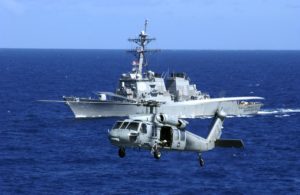Academy Securities Geopolitical Research Series: Today we are providing analysis by Major General James A. “Spider” Marks (Ret.) regarding North Korea’s nuclear program. Major General Marks is a member of The Advisory Board at Academy Securities and a CNN national security and military analyst.
This past Sunday morning, I woke up to The Washington Post headline below. I was not surprised. The candidacy of Donald Trump to be our next President is in an uncontrolled descent following the revelation last week of his lurid comments about women.
With this form of misogyny inexorably and sadly now defining the election, the prospects of discourse, topical discussions, debates of substance, and phrases that do not all begin with the first person singular pronoun “I or me” in response to an affront, real or imagined, are ethereal. We expect mudslinging in politics defined by routine challenges on issues and indelicate forays into charges of character weaknesses. However, this election has redefined low: low blows, low bar, low expectations, and increasingly low interest. The electorate is being offered a steady diet of invective and little opportunity to dig into issues of substance that differentiate the candidates.
The truly substantive issues that the American electorate should really be focused on have disappeared. Or have they?
Look at the enlarged picture below. It appears in regular font directly above the headline. It’s about North Korea and its nuclear capabilities. North Korea is not an “aspirational” nuclear power; it is a nuclear power. Now that’s really important, but wait: the readers must hold their interest until page A11 and avoid the marathon of NFL pre-game shows that are inevitably vying for our attention in the majority of American homes on Sunday morning.

North Korea is nuclear-capable but is not a signatory to the Nuclear Non-Proliferation Treaty (NPT). Those two facts should alarm you…greatly. Our intelligence community currently estimates that North Korea has 12-15 nuclear bombs of various yields. While North Korea has been building and testing nuclear weapons (five underground nuclear tests since 2006), North Korea has also been improving its missile technology at an alarming pace equal to its nuclear developments. Left unchecked and impeded only by time, North Korea will possess, probably in less than five years, a nuclear missile capability. The North will have an inventory of close to 100 nuclear bombs, missiles capable of reaching American soil, and the technology to “marry” the bomb to a missile. Although we can see with fairly precise accuracy what North Korea is up to with its development of both missile and nuclear technologies, we have never been confident that our intelligence can peek into the deliberately enigmatic regime in Pyongyang and discern their intentions.
The U.S.-R.O.K. (Republic of Korea) alliance has provided an effective deterrence to North Korean aggression for over 60 years. However, a nuclear North Korea capable of threatening the regional players (China, South Korea, Japan and Russia) and reaching the American mainland alters the existing defense calculus.
A couple of things to consider: First, the U.S. has deployed (in cooperation with Japan and South Korea) an enhanced, networked air defense capability that connects sea and land based surface-to-air missile systems, protecting citizens and preserving our military capabilities to counter strike. Second, under that protective dome, America’s two bilateral military alliances (U.S./South Korea and U.S./Japan) have incentivized global economic growth. While this is a clear positive, neither China nor Russia have contributed to the security conditions on the peninsula that have created this modern marvel of cooperation. That must change. They have to be visible and acknowledged participants in the effort to fashion a future that includes a more accessible North Korea.
North Korea will not change its spots overnight. That’s why our military alliance is so vibrant, capable, integrated, and powerful. But there has to be a more inclusive way to achieve a less bellicose North Korea. The certainty of the regime’s collapse through the application of force has not changed its path towards achieving a nuclear tipped missile capability. Let’s expand our cooperative efforts to include parties already in the circle: China and Russia.
Of course, the Japanese and South Koreans are paramount to the success of any strategy and have been fulsome partners in all previous and ongoing efforts, but neither China nor Russia are ever more than informed of our regional initiatives vis-à-vis the north.
Although their tactics differ, both Presidential candidates have demonstrated that they understand the necessity to change how we engage with China and Russia. We must create trust building measures so that all players can contribute to the solution of a non-nuclear North Korea or, minimally, a North Korea that is an NPT signatory. For example, Candidate Drumpf suggests we engage in trust building measures with Russia and cooperate to destroy ISIS in Syria; however, that’s a reckless strategy. We’ve never acted jointly in a hot war with Russia (or the Soviet Union) and trying to join forces in an ongoing hot war in Syria is an invitation for disaster and a guarantee of loss of American lives. The Korean peninsula, however, is different. Tensions are always high along the demilitarized zone in Korea (the line that separates the north and the south), but there is a choreography to the tension that bounds action.
Without increasing the risk to Japan and with the full and transparent military cooperation of the U.S.-R.O.K. coalition, Russia and China could be included in a more fulsome discourse on how to achieve an agreed-to North Korean solution. To be sure, the historic precedent is difficult to overcome. Since the mid-1980’s, Pyongyang has increasingly distanced itself from Beijing and Moscow. North Korea literally gets away with murder and it’s tolerated by China and Russia because North Korea has demonstrated military independence and a complete disregard for their oversight or engagement. North Korea is a recluse by choice. The only logical or effective way to challenge this isolation is through direct entreaties from their former benefactors.
As it stands now, North Korea will be capable of delivering nuclear tipped missiles by 2020. Our alliance with South Korea is as strong as it has ever been and there is no daylight in our shared view of the North Korean threat. However, our alliance remains predominantly, although not exclusively, a military one. The first job of the alliance is to de-escalate if there are hostilities. This is a defensive mission. To be clear, the U.S.-South Korean military coalition could offensively crush North Korea, threaten and destroy its capital, and reveal what the world no doubt already knows: that its maniacal leadership is bankrupt and exerts unchallenged power exclusively by fear.
By contrast, most planning around alternative futures on the peninsula center on regime collapse in Pyongyang and the resultant flood of 25 million North Koreans into the south. The integration into the west and environmental clean-up of East Germany following the collapse of the Soviet Union in 1991 was a herculean task of money, patience, and human kindness. Consider what will happen on the Korean peninsula if the brutal regime in Pyongyang falls from within. Over seventy years of nepotism, communism, and an imbedded hatred for western values will suddenly slam into free markets, free speech, iPhones, and Uber. That “clean up” will be huge and take decades.
That outcome, as difficult and monumental as it portends to be, is far more desirable than an unregulated, nuclear North Korea. We’ve planned for the former but can only speculate on the latter. Now that’s the headline.






